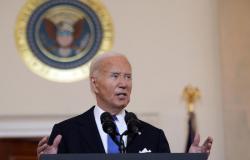Emmanuel Macron has failed in his bet. Three weeks after the slap of the European elections and the announcement of a surprise dissolution, the first round of the legislative elections is a new defeat for the presidential camp. The National Rally came out on top (33.5% of the vote) this Sunday ahead of the New Popular Front (28.5%) and the centrist bloc (22.1%). Will the RN have an absolute majority next Sunday? We talk about it with Benjamin Morel, doctor of political science from ENS Paris-Saclay and lecturer at Paris-Panthéon-Assas.
What is the first lesson of the first round?
This first round is a clear victory for the RN, which is in front and beats its record in terms of votes for a first round. But it is not a “chaos” victory like in the Europeans, because the left is not that far away. What is quite striking is not so much the overall results, but the overwhelming nature in certain constituencies, with many RN elected officials in the first round (at least 37). Certain national political figures also find themselves in difficulty, such as François Hollande, Olivier Marleix, François Ruffin, or Fabien Roussel who is already eliminated.
This is all the more notable because normally, in legislative elections, there is a demobilization of voters defeated in the presidential election, which benefits the winning camp. But this time, the RN wave is taking place while there is a very high turnout. This shows that there is a real surge of the RN in the country. And even if they do not have an absolute majority next Sunday, they will have strong legitimacy with more than 12 million votes.
Can the call for “Republican withdrawals” to beat the RN change the situation?
The left is doing excellently in the big cities, but at first glance not so well in rural, peri-urban areas, where the majority is not doing so badly. We can think that the transfer of left-wing votes to the majority will be better than the reverse. Because the centrist electorate may be afraid of Jean-Luc Mélenchon, there may be a repelling effect of certain LFI personalities and therefore of the NFP on the right and in the center. Especially since Jordan Bardella tried to talk to them during the campaign by abandoning his overly costly measures such as the pension reform. If there is a withdrawal, it is not certain that the voting instructions will really be followed. On the other hand, on the other side, the left-wing electorate should unite to beat the RN.
Does this election mark the end of Macronism?
There is a double failure by Emmanuel Macron. First, we can no longer really speak of Macronism, because the former majority no longer responds to Emmanuel Macron since the dissolution. There are those who follow Attal, others Edouard Philippe… Some have cast off and in the event of cohabitation, Emmanuel Macron will no longer have many troops with him, he already appears very isolated.
Moreover, the arrival of Macronism had led to the end of bipolarization: the central bloc, which did not have enough demographic weight, had managed to gain ground on the left and the right in the dynamics of the 2017 presidential election to become the majority. But now, it finds itself too weak. It is the end of Macronism because the central bloc is crushed, once again caught in a vice between the right-far right bloc and the united left. Emmanuel Macron will have himself closed the parenthesis that he had opened.





